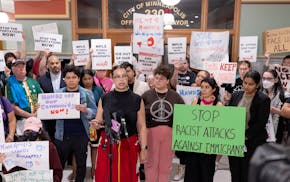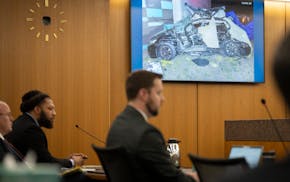The Minnesota House appears to be evenly split after Election Day, and recounts in two races could still swing the chamber if Republicans manage to claim either of the two seats Democrats are now clinging to by narrow margins.
It could be a while before control of the House is certain. Past legislative recounts have been conducted about a month after Election Day.
In the state Senate, Democrats retained their slim majority by winning a special election in suburban Hennepin County, and Gov. Tim Walz, who'll be staying in Minnesota after he and Vice President Kamala Harris lost their presidential bid, still has two years in his current term. A tied state House, or a slim Republican majority, would likely put big brakes on Walz's agenda in the 2025 legislative session.
The six-seat seat House majority Democrats held going into Election Day disappeared, leaving the lower chamber split 67-67 out of the 134 seats in the House. Two races Democrats led — one in St. Cloud and one in Shakopee — appear likely to head to recounts. If Republicans were to prevail in either race, the GOP would take control of the House and break the DFL trifecta that the GOP has argued led to spending increases and policy changes that went too far.
The Secretary of State's office showed DFL Rep. Brad Tabke of Shakopee with a 13-vote lead over Republican Aaron Paul, a Bloomington police officer, in District 54A. That margin is close enough to trigger a recount.
DFL Rep. Dan Wolgamott of St. Cloud had a 28-vote lead over Republican candidate Sue Ek. The District 14B race also would likely require a recount.
Democrats won the single Senate seat on the ballot Tuesday. It was vacant because Sen. Kelly Morrison resigned to run for Congress; she won the Third District race, succeeding Rep. Dean Phillips.
Just after 1:30 a.m. Wednesday, House Speaker Melissa Hortman, DFL-Brooklyn Park, said several races were "too close to call" to determine control of the House.
"It is important to be patient while we wait for results to be finalized," Hortman said in a statement. "All eligible voters in Minnesota should have their voices heard and their votes counted."
Republicans needed to pick up four seats to flip control of the chamber and break the DFL's trifecta. They've been talking up the benefits of divided government — one that moves more slowly and does not make new programs.
"Minnesotans are ready to move on from the expensive two years of Democrat one-party rule," House Minority Leader Lisa Demuth, R-Cold Spring, said in a statement before the election.
Around 12:30 a.m. Wednesday, Minnesota Rep. Lisa Demuth posted on X that "it appears that House Republicans have broken the Democrat trifecta in Minnesota with multiple DFL targets still outstanding." Demuth cited a lead for Republican Aaron Repinski in District 26A over the DFL's Sarah Kruger, and wins for two Republicans in District 41A and 41B.
The contest played out largely in the fastest-growing Twin Cities suburbs and exurbs such as Lake Elmo, Shakopee, Lakeville, Chanhassen and Blaine, as well as in St. Cloud, Duluth and the college towns of Winona and St. Peter.
Candidates can request a publicly-funded recount in legislative races where the candidate that appears to be winning has a lead of less than 0.5% over another candidate. In a recount, ballots are assembled and counted precinct by precinct in the county where the voting took place, according to the Minnesota Secretary of State's Office.
Before a recount is requested, the state Canvassing Board needs to gather to certify the election results. That meeting is scheduled for Nov. 21. In recent legislative elections, recounts have generally taken place about a month after Election Day.
Only trained election officials can handle the ballots in a recount, but candidates or someone representing them, along with members of the public, may view the process. Candidates' representatives can challenge a election official's determination about a voter's intent on a ballot, which could lead to further review by a canvassing board.
If the House ends up evenly split, it wouldn't be the first time – but it has been quite a while. The House last convened with a 67-67 tie in 1979. In that case, leadership agreed to have Republicans take the speakership and divided control of powerful committees and committee subdivisions between the parties.
Even if the House isn't evenly divided, a narrow majority will mean the party in charge will have to work hard to keep their members aligned, attendance will be paramount and bipartisan deals will be important.
Greater Minnesota contests
Republican Erica Schwartz beat incumbent DFLer Jeff Brand, who has served two nonconsecutive terms representing District 18A, which includes St. Peter and North Mankato. The seat has swung between the two parties for the past two election cycles.
DFL Rep. Gene Pelowski's retirement after serving 38 years shook up the race for House District 26A, which includes the college town of Winona. Aaron Repinski, a Republican and member of the Winona City Council beat FairVote MN's Sarah Kruger, a DFLer.
Biden carried the district by 10 points in 2020, but Republicans said the area is trending conservative.
Suburban battlegrounds
In House District 57B in Lakeville, Republican Rep. Jeff Witte won re-election in a district that sits smack in the middle of the Second Congressional District. That larger contest has meant both parties pumped resources into the area. Brian Cohn, a political newcomer, was the DFL's nominee. President Joe Biden carried the district in 2020.
Republican Wayne Johnson, a former Washington County commissioner, defeated DFLer Lucia Wroblewski, a former St. Paul police officer, in District 41A. Previously, GOP Rep. Mark Wiens won the Lake Elmo and Afton district by just 128 votes in 2022, and is retiring after one term.
DFL Rep. Lucy Rehm of Chanhassen narrowly defeated Republican Caleb Steffenhagen in House District 48B. Steffenhagen, a middle school history teacher at a charter school and officer in the Army National Guard, challenged Rehm in the fast-growing district.
First-term DFLer Matt Norris was re-elected to Blaine's House District 32B over Republican Alex Moe. In 2022, Norris who beat an incumbent Republican by just over 400 votes after the district was redrawn.

Minneapolis City Council lowers street food cart license fee, hoping fruit sellers will hawk legally

How the federal raid unified the fractious Minneapolis City Council against Trump, sort of
Trump travel ban 'cruel,' Minnesota advocacy group says

No verdict after first day of jury deliberation in Derrick Thompson murder trial for crash that killed 5

